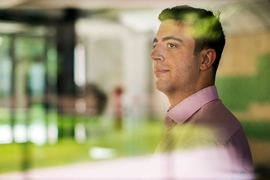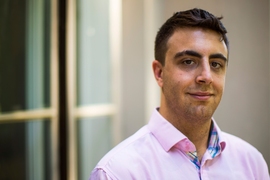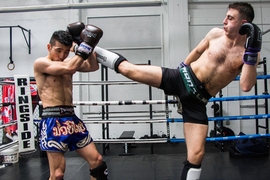Before coming to MIT to pursue a PhD in chemistry, Levi Knippel would spend hours after his workdays at Genentech, where he was an associate scientist, training with two world champion kickboxers. “It helped me break out of my shell,” he says of the sport. “This zen state of just me, my body, and my opponent trying to hurt me –– it’s like this chess match.”
In the ring, he has a combined record of one win, one loss, and one draw. “Nice and balanced,” he says with a laugh.
Knippel describes kickboxing as a challenging puzzle that requires creativity and strategy more than brute strength. A similar, though less physical, affinity for such puzzle-solving drew him to organic chemistry in high school, and ultimately to MIT, where he now studies copper-hydride chemistry. Working with molecules also requires a delicate sense of touch and balance, he says.
Unfortunately, both passions have been put on hold for the moment, due to the Covid-19 pandemic and a torn shoulder that’s kept him out of the ring. Instead of managing reactions and purifying materials in the lab, he has been writing manuscripts, submitting abstracts to conferences, and studying for his oral exam, at his home in Allston, Massachusetts. “I miss working with my hands,” he says. “When you get that material you’ve been working on for a couple weeks, and you hold that powder in your hands, it’s really satisfying.”
Wrestling with compounds
As part of the Buchwald Research Group in the Department of Chemistry, Knippel works on taking olefins, chemicals that are relatively easy and cheap to produce, and using copper catalysts to generate new compounds that might someday aid in the design of new drugs and other therapies. These compounds are chiral, having two possible orientations; in many cases, only one of those orientations might be effective in the body.
In the initial few months of his thesis project, it seemed like he was getting 95 percent of the desired chirality, but it would stubbornly turn into a 50-50 mixture over time. Ultimately, he solved this issue, which turned out to be related to his purification method. “You have to every day go to work and continue to have self-confidence to know that you’re doing everything right,” Knippel says. “Sometimes the chemistry just doesn’t work. If it worked, it would have already been discovered.”
Knippel says the chemistry department community gets him through the really difficult moments, which has also motivated him to take on leadership roles within it. As the president of the Chemistry Graduate Student Committee, he’s been liaising with other groups like Women in Chemistry and the Chemistry Alliance for Diversity and Inclusion to make the department more welcoming and inclusive. One event he remembers fondly was a department fall festival last year which marked the first big collaboration between all the student groups. “It’s just a joint effort among all these groups to make it a community that everyone wants to be a part of,” he says.
His department, he says, is the kind of place where, after learning that he had been through a particularly bad day, every member of his 40+ person cohort gave him a hug. “That’s when I knew I was in the right place,” he recalls.
A long way from home
Part of what set Knippel on the path to MIT was his strong mentorship during his undergraduate years at Johns Hopkins University. “Looking back now it was kind of presumptuous,” he says, recalling how he met his mentor, chemistry professor Thomas Lectka. On the very first day of his first year, Knippel boldly knocked on Lectka’s office door, entered, and got a position as a lab researcher. “I wanted to see how the sausage is made, so to speak,” he says. “I ended up loving it. I realized that if I do this as a career, no two days would be the same for the rest of my life.”
But at Hopkins, undergraduate research was unpaid –– and Knippel, even on full scholarship, struggled to make ends meet. Lectka helped him land a teaching assistant position that allowed him to stop working campus jobs and instead to deepen his experience in the field while maintaining a consistent source of income.
“What he did to make me be able to focus on science was huge,” Knippel says. “I just can’t imagine that I’d be where I am now if he hadn’t given me these opportunities to prove myself. I feel like I worked much harder because he was going out of his way to make my life easier.”
Finding the TA position was just one of the ways that Knippel had to navigate college as a low-income student. It had come as a surprise to him, and to many that he grew up with, that top universities had robust financial aid programs that might be open to him. And once at Hopkins, he still struggled financially. “I knew classmates who just got new laptops when theirs broke, but I basically saved everything I had to buy a Chromebook, which couldn’t even run all the programs I needed for class,” he recalls.
“I feel like I need to pay forward all the opportunities and help that have been provided to me,” he says. “That’s why I’ve been involved with programs such the MIT Summer Research Program, which aims to increase diversity in science by bringing students from underrepresented backgrounds to MIT to do research.”
“If you can, you do”
Knippel’s mother has also helped propel him on his path to academia. She had been attending university on a musical scholarship, but ultimately left before graduating, when he was born. With his biological father out of the picture, he lived with his mother and her friend in a trailer for the first years of his life. The friend would provide childcare while his mother took longer shifts at work in order to spend more time with him. Eventually his mother got married and the family settled in Two Rivers, Wisconsin, where he went to middle and high school.
“My education was always the most important thing to her,” he says of his mother. “She chose to stop her education because she had me, and just put all that energy into me.” He recalls how she put a bookshelf in the trailer and would scope out every garage sale in order to fill it with books. She also pushed him to apply to schools out of state, when many students in the area went to the state university. “It’s important that if you can, you do,” he remembers her insisting.
His years as a teaching assistant and his relationship with his mentor drew Knippel into teaching himself. The summer after college, before starting his job at Genentech, he worked as a lecturer at Montgomery College, a community college in Maryland, teaching organic chemistry to underrepresented and nontraditional students. He’s still in contact with some of them –– even helping them apply to graduate schools.
He’s still contemplating teaching as a career, although he’s also intrigued by the possibilities of working at places like Genentech, where the development of a drug could save thousands of lives. But Knippel, who is in the third year of his PhD program, still has some time to decide. “I don’t want to rule anything out,” he says.













